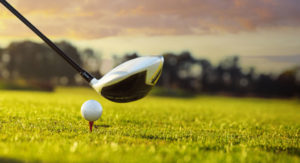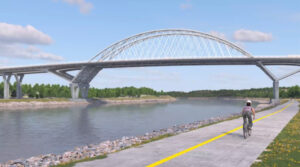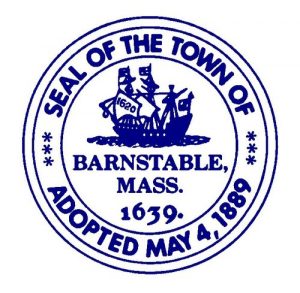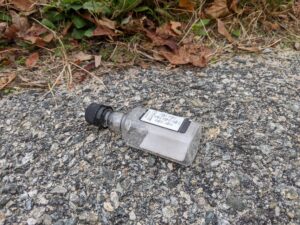 HYANNIS – Tiger Woods’ dramatic victory at the Masters golf tournament on April 14 was an impressive comeback after four back surgeries. For other golfers, it’s a reminder that golf can be hard on the back – but there are ways to prevent and treat spine injuries.
HYANNIS – Tiger Woods’ dramatic victory at the Masters golf tournament on April 14 was an impressive comeback after four back surgeries. For other golfers, it’s a reminder that golf can be hard on the back – but there are ways to prevent and treat spine injuries.
Professionals don’t put much strain on their backs, said Paul Houle, MD, FAANS a neurosurgeon who specializes in minimally invasive spine surgery.
“For the rest of us, it’s actually not the golf swing, but our physical limitations; say a bad hip or bad knee, that affect how we swing the golf club,” said Dr. Houle, who practices at Cape Cod Healthcare Neurosurgery in Hyannis.
“For example, I have very limited range of motion in my thoracic [upper back] spine and limited rotation in my left hip, which causes certain characteristic swing faults that then focus the stress on the low back. That can lead to injury.”
A Common Injury
A recent study published in the Journal of Neurosurgery: Spine found that back disorders are the most common injuries for golfers, affecting 35 percent of amateurs.
Dr. Houle described the most typical back injuries suffered by golfers.
“The most common thing would just be your simple lumbar [lower back] sprain where your facet joints and the muscles that connect the facet joints that support the spine get irritated because of extreme ranges of motion. That’s like a muscle pull and is easily treated with anti-inflammatory medications and stretching.
“The second most common thing would be irritation to the facet joints themselves, especially in the older population where there’s already a little bit of arthritis. The swing stresses the joints beyond what they’re normally used to or capable of. That leads to irritation of the facet joint capsule and that leads to back pain.
“The third thing would be, especially in the older population where you have a little bit of the narrowing of the spinal canal due to spinal stenosis, is compression and irritation of the nerves. That leads to back pain and leg pain.
“Lastly, the most rare would be a herniated disc in the back, which, of course, was originally what Tiger had.”
Houle said Woods’s back problems might have started after his knee surgeries.
“He had to compensate for a physical limitation and that could affect his golf swing. It also could have just been something innocuous, as with what happened with golfer
Jason Day over the weekend when he bent over to pick up his kid. Tiger is a private guy, so we’ll never know what the true story is.”
Cause and Prevention
One thing that leaves people at risk of a golf swing injury is the amount of sitting that most of us do.
“We spend the vast majority of our days sitting and when you sit, you get muscle imbalances,” said Dr. Houle.
“When you sit down, your legs come up towards your belly so your hip flexors flex and the opposing muscle group, the gluteus, your butt muscle, has to relax. The gluteus muscle gets long and weak and your hip flexors get short and tight. Likewise, when you’re sitting down, your stomach muscles get short and tight and your back muscles get long and weak.
“If your back muscles are long and weak, they can no longer support the joints of your spine, which leads to irritation and pain.”
“We have people focus on core stabilization and hip flexor mobility. When you go to physical therapy, they do a lot of exercises to lengthen the hip flexors. And people ask, ‘Why are you working on my hips? It’s my back that hurts.’ Well, it’s all related.”
Dr. Houle recommends that serious golfers have a screening by a Titleist Performance Institute certified instructor. Through a series of physical tests, the instructor can determine a golfer’s physical limitations and their likely swing faults are going to be and then design an exercise program to address those physical limitations.
“There are many correct ways to swing a golf club, but people possess physical limitations that introduce characteristic swing faults,” said Dr. Houle. “Those swing faults can lead to injury when you try to compensate for them. By having an exercise program designed to treat those physical limitations, you can avoid those swing faults and therefore avoid injury.”
Dr. Houle, who is a TPI instructor but does not do screenings, wrote two articles for the TPI web site. One is about when to have surgery for herniated discs; the other is about how to rehab your back after back surgery.
Tiger’s Comeback
Woods underwent two discectomies in 2015. In 2017, he underwent anterior lumbar interbody fusion (ALIF) surgery, a procedure Dr. Houle learned 17 years ago during his residency and occasionally performs at Cape Cod Hospital.
“You can imagine what happens over time if you’ve had two disc herniations,” he said. “That takes up space between the bones and if you lose that material, what’s going to happen is the disc space is going to collapse. The holes where the nerves exit the spine become greatly narrowed and that is a constant source of irritation.
“So every time he would move or twist or bend, it would pinch the nerves and that gave him pain. The ALIF places a spacer and elevates the bones back to where they are supposed to be to keep those holes open and stabilize the spine, so it doesn’t move. It’s a very good operation.”
Two years after his ALIF surgery, Woods surprised the golf world by winning one of the game’s biggest tournaments.
“I’ve played the course and I think that anybody who wins a Masters is impressive,” said Dr. Houle.
“I think it’s actually not predictable, but not surprising that he made it back. He has access to the best physiologists and best physical therapists and the best golf trainers that the world has to offer, so it’s not surprising to me that he was able to get back and play professional golf.
“Now to go on and win the Masters, I think it’s as much his mental focus as it was his physical capabilities that allowed him to win.”
























